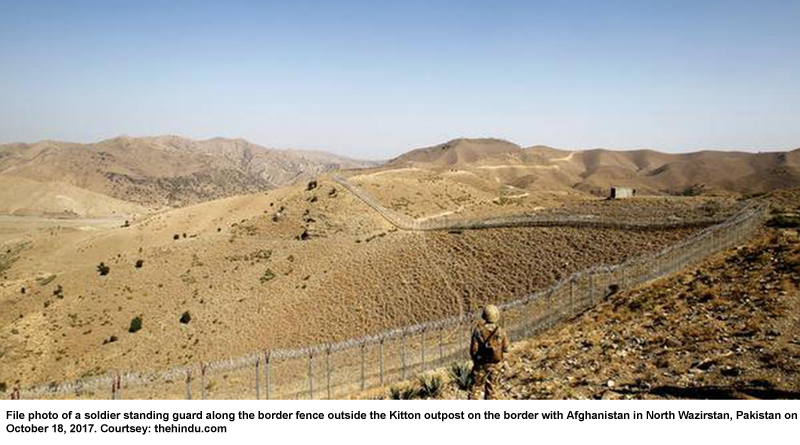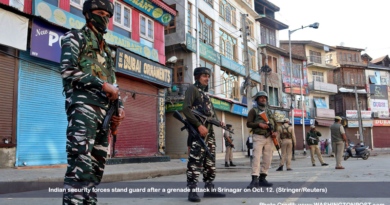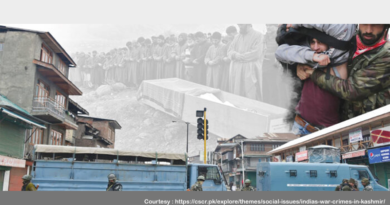Pakistan has taken a suicidal route by bombarding Afghanistan
Europe’s modernization, and by extension the emergence of modern global civilization, is usually dated back to 16th century AD. Something phenomenal happened around this time: money-making (drive for acquisition of wealth for the sake of it) which was hitherto at best ethically tolerated became a supreme pursuit for people to strive for. A subject of much debate in intellectual circles, some credit the rise of Protestantism for promoting the idea of money-making as a divine responsibility and a path to salvation, while others argue that during the tumultuous era of post-church Europe, amidst the collapse of feudalism and the proliferation of commercial enterprise, those at the centre of power structure and the ‘establishment’ of the time, actively encouraged wealth accumulation as a means of deterring misbehavior, keeping people out of mischief. No matter what happened, the net result was that money-making became the foundation of a new civilization we still are living in.
Super-fast- forwarding to 1947, something monumental happened, and this time, not a civilizational but a geo-political reality was created. This was Pakistan which emerged as a new state from British Indian Empire. Like the question how did money-making come to form the foundation of modern civilization, we ask how did Pakistan come into being. Here we have two broad schools of thought: one, that Muslims asserted their identity and brotherhood, rallied around the motto ‘Pakistan ka matlab kya, la ilaha il-Allah’ (What is the purpose of Pakistan, There is no god, but Allah) and formed a new country. The other, the departing colonial power Britain (Read: The West), wanted a front-line state in the region against the rising communist power, the Soviet Union, and, therefore, created Pakistan ensuring that the new state at the very inception emerges weak and ‘moth-eaten’ thereby remaining existentially threatened by its big hostile neighbour India, and as a result beholden to the West for its protection.
That was a brief comment about the two historically created present-day realities, namely, Pakistan of today, and the modern civilization we are living in. One might wonder what the connection is.
Apparently they are two unrelated things, so what is the point in lumping them together? The answer is, there is a point: though apparently unrelated, they are nonetheless related in a basic sense: both are historical products, and the point I want to make relates to the genesis of historical products. Pakistan is my focus here; I am only alluding to modern civilization in order to draw a comparison and thereby lend some contextual depth to the point being made. It is a subject of much greater scope and would require a deeper study, but for now the point to note here is that in the genesis of such historical realities a multitude of factors participate—I have mentioned only two for each of them—-and not all of them survive the course of history; some outlive their purpose and cease to exist, or become dormant while others grow more dominant, and decisive in shaping the actual character of the reality so much so that it is only through the lens of that dominant factor(or factors) that the current reality can truly be comprehended.
Take modern civilization– Salvation, Protestantism or any other –ism for that matter, is nowhere now, money-making is everywhere, it permeates the civilization. So many other factors might have entered into the genesis and subsequent development of this, but what has survived and is now the active ingredient, if you like, is that original factor mentioned above: glorification of money-making by the powerful of the time. Religious factor did play its role, and served the purpose of creating the capitalist order, and then disappeared or became dysfunctional.
Now to the state of Pakistan: The motto ‘Pakistan ka matlab kya, la ilaha il-Allah’ was a very powerful factor, it served the purpose of mobilizing Muslims of British India creating a powerful movement (though not confrontationist or agitationist as the one led by Gandhi. Keep in mind this is a fact of great significance that had long-lasting consequences—still noticeable—for the state and people of Pakistan. We will skip it for now) which successfully delivered Pakistan. Did it continue beyond serving that purpose? Well, the historian will answer, for us—those analyzing the present—-the answer is a big no: we don’t see any indications of it as we look into how the state has been, and is behaving. Not that it is no more; the Pakistan of today (as is Bangladesh, but that is beside the point now) is a living testimony to the murder of that factor, the country is not the one that emerged in 1947; it is a new entity sitting on the dead body/graveyard of its parent entity.
Now what about the other factor, namely, the British plan of creating a frontline state? Has it surpassed its practical usefulness or is it still live and operational? It has survived, nay, grown stronger and operationally more assertive by the day. A cursory look at what has been driving the policy of the sate of Pakistan clearly shows that this factor has been the real operative factor all along, and it is because of this that Pakistan has till date not been able to solve a single problem of its own, Kashmir being the most notable. Bombing Afghanistan is the loudest expression of the fact that the state of Pakistan is nothing but an outpost of the West led by United States of America. If this factor is not figured in while looking at the state of Pakistan, its policies from time to time, and most notably the latest military action in Afghanistan will become incomprehensible. Let us look at this military action now:
In August 2021, the Taliban gained control after years of armed conflict. This time, they presented themselves as a politically mature group, with a new perspective and willingness to cooperate with neighboring countries such as Iran, and also China and Russia. The relationship with China and Iran made Taliban a suspect in the eyes of US, and given the current global geopolitical landscape, Afghanistan is seen as being part of the informal grouping comprising Russia, China and Iran which has been asserting its autonomy vis-à-vis US supremacy. US does not want Taliban to succeed, and would resort to any means to destabilize the regime without getting directly involved. US can use its ‘reserve’ force ISIS. Writing in his NYT column on 5th March the senior New York Times columnist Thomas Friedman reported that on his trip to seven U.S. military bases in western Jordan and eastern Syria with America’s senior Middle East Centcom commander, Gen. Michael Kurilla, he saw 43000—a sizable number indeed— ISIS people including their brides and children at Al Hol detention camp held in tents and prefabs under Kurdish guards in northeastern Syria. The so-called Khurasan branch ISIS-K could be used for destabilization and US may use Pakistan as local handler. After regime change in Pakistan in 2022, one could see Pakistan raising the ante and sort of deliberately creating a confrontational dynamic with Afghanistan. In response to terrorist attacks in Pakistan, when Pakistani officials would point fingers at the Taliban for not stopping the use of their soil for such acts, Afghan authorities would come up with a seemingly logical explanation: of all our neighbours(and there are many—China, Iran, Uzbekistan, Tajikistan) why does only Pakistan complain about Afghan interference. That would put a question mark on the genuineness of such complaints. Add to this that in recent times if a terrorist attack happens somewhere, no one is blaming Taliban as in past. In the terrorist attack in Moscow earlier this week, no one was seen blaming Taliban. Also, there are credible reports that India—the avowed enemy of Taliban— is seriously engaging the Kabul regime, and we might see some sort of formal working relationship developing between the two in near future. In this scenario Pakistan is left alone in accusing Taliban of harbouring terrorists on its soil. One is inclined to believe that the former is being drawn into US’s dirty game in Afghanistan, and the recent terrorist attacks in Pakistan, coupled with the subsequent accusations might have been setting the stage for Pakistan to launch a retaliatory strike on Afghan soil which it did on 18th March. This stupid action completely defies logic. No sane person will make sense of it, and the one who does is not sane. Just look at the world of facts and realities.
India is sitting on Pakistan’s east as a blood- thirsty ferocious beast to devour it and turn it to pre-Islamic ages, dismantling of Pakistan continues to remain on the political-strategic agenda of Indian state. If Pakistan’s western border turns hostile or unfriendly, will it not be godsend for India? There is no explanation apart from the fact that the state of Pakistan is used by others. Afghanistan may be a weak/small country but its immense strength derives from the fact that it is a neighbour with whom Pakistan shares a vast border. And not only that, Afghanistan in a way is ‘inside’ Pakistan: the huge Pakhtoon population in Khyber Pakhtoon Khwah and Balochistan are Afghans, Durand line separating Pakistan from Afghanistan remains a British-drawn and Pakhtoon- rejected dividing line. By taking on these brotherly people is not the state of Pakistan treading on a self-destructive path? All these apparent puzzles are instantly resolved if the right lens is used: the West has made it for its own agenda. They could not have got rid of Soviet Union if Pakistan was not there. In numerous other instances, one would justifiably ask whose interests—definitely not its own—have Pakistan’s politics, diplomacy, war, and international conduct, truly benefitted?
2 Points at the end:
- Pakistan has a vast fertile land, huge resources, and a large population. It needs an independent state. This is what Imran Khan calls ‘ Haqeeqi Azadi’.
- This is a subject of theoretical debate, but the comparison above suggests that in historical products what endures as the dominant factor is the one rooted in the interests of the powerful at the time. Britain as the imperial power was definitely the most powerful in 1947.
*******************************************************************************************
London 24th March, 2024
About Blogger:
Dr. Syed M. Inayatullah Andrabi is the founder convenor of Mahazi-Islami, Occupied Kashmir. He is an intellectual-political activist from Srinagar, capital city of occupied Kashmir. The author can be reached at [email protected]




